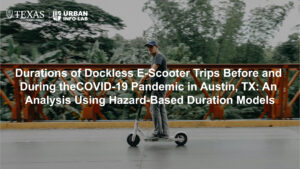Abstract: The 2019 coronavirus pandemic has profoundly impacted global life, including economies and transportation systems, leading to shifts in travel behaviors. This study investigates the relationship between socio-economic factors and e-scooter trip durations before and during the pandemic. Using hazard-based duration modeling, we analyze data from Austin’s Open Data Portal… read more
Integrating social equity in highway maintenance and rehabilitation programming: A quantitative approach
ABSTRACT: Facing budget constraints and an aging highway infrastructure, decision-makers must balance cost-effectiveness with environmental and social equity considerations. While numerous studies address economic and environmental factors in infrastructure management decisions, few offer quantitative methods for integrating social equity into highway Maintenance and Rehabilitation (M&R) decision-making. This paper proposes four… read more
Exploring the association between the built environment and positive sentiments of tourists in traditional villages in Fuzhou, China
ABSTRACT: Ensuring positive emotional experiences for tourists is crucial for rural development sustainability, yet research often neglects the rural built environment. This study fills this gap by investigating the impact of the rural built environment on tourist emotions, focusing on traditional villages in Fuzhou, China. Natural Language Processing (NLP) techniques… read more
Cities reshaped by Airbnb: A case study in New York City, Chicago, and Los Angeles
Abstract: Over the past decade, Airbnb has evolved from a modest online bed and breakfast platform to a prominent global hospitality service. Scholars have utilized various spatial analysis techniques to investigate its influence on urban areas. This graphic employs cartogram processing to visualize Airbnb listing density in three major US… read more
An empirical analysis of Airbnb listings in forty American cities
ABSTRACT: Over the last decade, Airbnb has evolved from a small bed and breakfast service to a global hospitality giant operating in 80,000 cities worldwide, offering various accommodations and experiences. With its expansion, there’s increased scrutiny from cities, researchers, and the public on its impacts and the need for regulation.… read more
Hurricane Harvey: equal opportunity storm or disparate disaster
ABSTRACT: Following Hurricane Harvey, media outlets labeled it as an “equal opportunity” disaster, challenging existing research on social vulnerability which indicates marginalized groups face disproportionate risks and impacts from disasters. To assess the accuracy of this claim, we utilized regression techniques to analyze the relationship between social vulnerability indicators and… read more
Exploring the Spatial Distribution of Air Pollutants and COVID-19 Death Rate: A Case Study for Los Angeles County, California
Abstract: Since March 2020, COVID-19 has spread globally, resulting in millions of deaths. The role of air pollutants in exacerbating respiratory illnesses like COVID-19 remains unclear. While regional studies have explored this association, its consistency at the neighborhood level is uncertain. This study compares weekly COVID-19 death rates across 11… read more
Traffic Behavior Recognition from Traffic Videos under Occlusion Condition: A Kalman Filter Approach
Abstract: Real-time traffic data is crucial for adaptive traffic light control systems. Traditional sensors like infrared radiation and GPS lack detail. Surveillance cameras offer potential for detailed traffic analysis. This study utilizes a You Only Look Once (YOLO) algorithm for vehicle detection and tracking in traffic videos, aided by a… read more
Predicting and mapping neighborhood-scale health outcomes: A machine learning approach
Abstract: Estimating health outcomes at a neighborhood level is crucial for urban health promotion but can be resource-intensive. This paper introduces a machine learning approach to predict the prevalence of six common chronic diseases at the census tract level in Austin, Texas. By experimenting with eight machine learning algorithms and… read more
Land value impacts of Airbnb listings on single-family homes in Austin, Texas, USA
Abstract: This study investigates the impact of Airbnb listings on land values in the Austin, Texas area, focusing on single-family homes. Using three models—ordinary least squares regression, geographically weighted regression (GWR), and Bayesian analysis—it examines spatial distribution and temporal effects on land parcel data within Travis County. Results suggest that… read more













